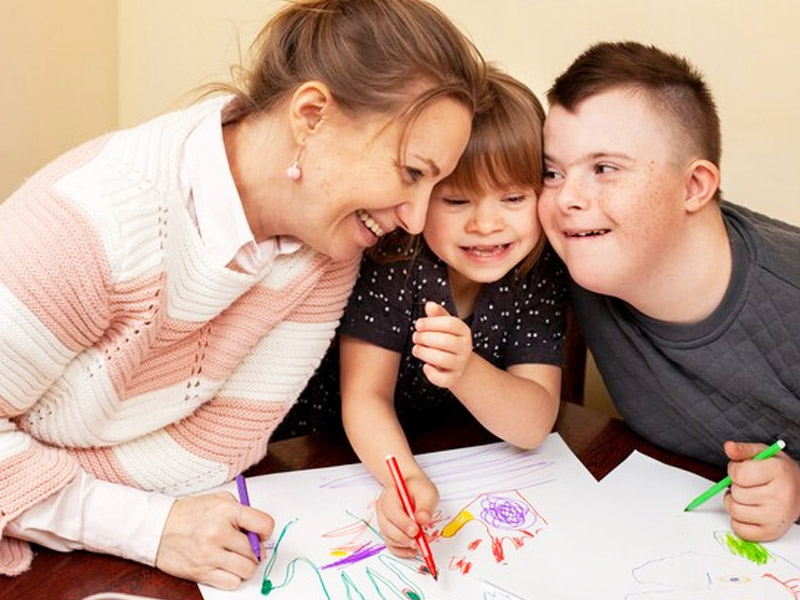
Down's syndrome is a condition caused by a chromosome abnormality. When cells divide abnormally, additional genetic information from chromosome 21 is produced, causing the disorder. Distinct facial appearance, cognitive impairment, and overall developmental delays are symptoms of this condition. While people with down’s syndrome frequently endure discrimination and neglect from society, it is often the parent who faces added burden of dealing with society and their personal feelings. Patience, sensitivity, like-minded community, and much more are required! Onlymyhealth editorial team spoke to Ms. Shuchita Dua: DGM- Clinical Head Online Vertical, Mom’s Belief, about some helpful tips to raise a child with down syndrome.
Table of Content:-
Tips for parents to raise a child with down's syndrome
When parents find that their kids have Down's syndrome, they are left with the question of how to raise the child. Would we be capable of providing for the child's needs? What are our options? What should be avoided? This list goes on and on. Here are a few parenting suggestions that will assist you in raising your child with Down's syndrome:
1. Making prenatal preparations

During prenatal check-ups, this issue is usually discovered before the baby is born. As a result, it is critical that you see your doctor prior to giving birth as the baby with Down's syndrome on the way to being born will need intensive care. The consultation with medical professionals and Down's syndrome specialists, however, should continue after the delivery for guidance on how to raise the child with additional care and attention!
2. Research responsibly
Researching, accumulating information, and remaining informed can enable you to offer your child better care and a higher quality of life. However, It’s always important to consult an expert and share the information to authenticate the claims.
Also read: Risk of Blood Cancer Is Higher In Children With Down Syndrome: Study
3. Seek medical help for your child
As parents, you must accept that your child is differently-abled and will require ongoing medical care. Along with physical and mental health issues, basic activities like crawling, walking, and speech are frequently a challenge for them. As a result, arranging regular checkups with a trusted specialist is the best approach to stay updated with their progress and guarantee that your parenthood goes successfully.
4. Allow your child appropriate freedom to make decisions
As the kid grows, they may feel constrained by the restrictions imposed on them as a result of their situation, as well as those imposed by their parents. This can make individuals feel as though they are unable to live their lives according to their preferences, which can have a negative effect on mental health.
It’s always better to give them appropriate freedom in simple decisions like allowing them to choose anything they want to dress, eat, and go out to offer them the satisfaction of having control over their lives! Support open communication and know when to allow them freedom in the appropriate locations while also holding their hands at inappropriate moments.
5. Set a schedule

When babies with Down's syndrome have a set schedule and live a healthy lifestyle, their life expectancy increases. Getting up and going to bed at regular hours, eating a nutritious diet, engaging in physical activities according to their comfort and health, studying, and participating in extracurricular activities are all essential measures that will provide them with a better quality of life.
6. Practice self-care
To be a parent of a child with Down's syndrome is a challenging journey! Juggling your work and home life while caring for a special-needs child can be exhausting. As a result, it's critical that you schedule “me time” for yourself and participate in activities that are healing for you. You must realize that loving and pampering yourself is not self-indulgent. You need it! Share your experiences, socialize, and seek outside support to care for the infant whenever necessary. Opt for counseling when things get stressful for you as it will help you in managing your mental health and any difficult situations.
Also read: What Is Down Syndrome, How Is It Detected And Care Tips
Professional intervention in down's syndrome
Professionals provide a variety of specialized programs and resources for children with Down's syndrome and their families. These early interventions reportedly help children reach their highest potential, independence, and productivity throughout their lives. Special teachers, Speech and language therapists, Occupational therapists, Physiotherapists, and Social workers are examples of these specialists.
1. Physical therapy consists of tasks and exercises that assist to improve motor skills, muscle strength, posture, and balance.
2. Speech therapy can assist children with Down syndrome to enhance their communication abilities and improve their language sills.
3. Occupational therapy aids in the adjustment of daily duties and conditions to meet the requirements and abilities of a person.
4. Behavioral and emotional therapy help in finding useful responses to both desired and undesired behaviours. Children with Down's syndrome may feel irritated due to communication difficulties, develop compulsive behaviours, and suffer from Attention Deficit Hyperactivity Disorder (ADHD), among other mental health problems. The trained therapists devise methods and tactics for avoiding or replacing those behaviours in the future.
In order to completely support your child with Down’s Syndrome, you must accept that it’s okay to make mistakes during this journey and learn. It takes time and immense support. You can join social media support groups to communicate with other parents and families who are dealing with the same problem and hoping for a good life. The key to bringing up a child with Down's syndrome is to be kind to both yourself and the child!
All image credits: Freepik
How we keep this article up to date:
We work with experts and keep a close eye on the latest in health and wellness. Whenever there is a new research or helpful information, we update our articles with accurate and useful advice.
Current Version
